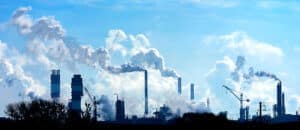Are you ready to learn about what makes air pollution a global problem? Keep reading and find out everything you need to know about it!
Air pollution is a pressing global issue affecting public health and the environment. In recent years, Scientists have discovered that air pollution has some surprisingly creepy environmental effects. This includes causing plants to grow differently, reducing the populations of certain types of animals, and even making it harder for rainfall to occur.
Some forms of air pollution are more harmful than others. Tiny particles called particulate matter (PM) cause the most problems when it comes to global air pollution.
These particles can come from many sources, including car and truck exhaust, power plants, and fires. They can be carried long distances by the wind and deposited in locations far from where they were originally emitted. This makes it a global problem and one that requires collaborative efforts to solve.
What Is Air Pollution?

Air pollution is a gas, liquid, or solid substance released into the air, making it unsafe to breathe. The main source of air pollution is human activity, such as burning fossil fuels, manufacturing chemicals, and driving cars. Air pollution can also come from natural sources, like volcanoes and forest fires. Breathing in polluted air can cause headaches, nausea, and respiratory problems.
Long-term exposure to polluted air can lead to lung cancer and heart disease. To reduce air pollution, we can use public transport instead of cars, plant trees, and use clean energy sources like solar power.
What Makes Air Pollution A Global Problem?

Air pollution is a global problem for several reasons. First, air pollution does not respect national boundaries – it can travel long distances from its source and can have an impact on countries downwind of the polluting source.
Additionally, air pollution can have a regional or even global impact – for example, the burning of coal in one country can contribute to acid rain in another country hundreds or even thousands of miles away.
Finally, air pollution can significantly impact the environment as a whole – for example, releasing greenhouse gases into the atmosphere can contribute to global climate change. As a result, air pollution is a global problem that requires international cooperation to address.
What Causes Air Pollution?

According To the Geographic Society, air pollution is caused by releasing contaminants that harm human health and the environment. The main sources of air pollution are vehicles, power plants, and factories.
These emissions contain a variety of pollutants, including carbon monoxide, nitrogen oxides, sulfur dioxide, and particulate matter. Vehicle emissions are a major source of air pollution, accounting for more than half of all emissions in many cities.
In addition to causing smog and haze, these emissions also contribute to climate change. Power plants and factories also release large amounts of pollutants into the air, including mercury, lead, and other heavy metals. These pollutants can cause various health problems, including respiratory illness, heart disease, and cancer.
Particulate matter is another pollutant that can be released into the air by various sources. This includes dust from construction sites, farming operations, and unpaved roads.
Particulate matter can cause difficulty breathing, asthma exacerbation, and other respiratory problems. It is important to reduce air pollution from all sources to protect public health and the environment.
Cars
Cars are a leading cause of air pollution, emitting harmful gases and particles into the air. When gasoline is burned in a car engine, it produces carbon monoxide, nitrogen oxides, and other pollutants. These gases can cause respiratory problems, heart disease, and other health issues.
Factories
Factories also produce large amounts of air pollution, including carbon dioxide, sulfur dioxide, nitrogen oxides, and particulate matter. These pollutants can cause respiratory problems, heart disease, and other health issues. They can also contaminate water supplies and damage ecosystems.
Coal-fired Power Plants
Coal-fired power plants are:
- A major source of air pollution.
- Emitting large amounts of sulfur dioxide.
- Nitrogen oxides.
- Particulate matter into the atmosphere.
These pollutants can cause respiratory problems, heart disease, and other health issues. They can also contaminate water supplies and damage ecosystems.
Aviation
Aviation is a major source of air pollution, emitting large amounts of carbon dioxide and other pollutants into the atmosphere.
These pollutants can cause respiratory problems, heart disease, and other health issues. They can also contribute to climate change.
Shipping
Shipping is a major source of air pollution, emitting large amounts of sulfur dioxide, nitrogen oxides, and particulate matter into the atmosphere.
These pollutants can cause respiratory problems, heart disease, and other health issues. They can also contaminate water supplies and damage ecosystems.
Agriculture Activities
Fertilizers and animal waste are among the main sources of air pollution from agriculture. Ammonia and other pollutants emitted can cause respiratory problems, heart disease, and other health issues. They can also damage ecosystems.
Wildfires
Wildfires are:
- A natural source of air pollution.
- Emitting large amounts of carbon dioxide.
- Nitrogen oxides.
- Particulate matter into the atmosphere.
These pollutants can cause respiratory problems, heart disease, and other health issues. They can also contribute to climate change.
Volcanoes
Volcanoes are a natural source of air pollution, emitting large amounts of sulfur dioxide, carbon dioxide, and other pollutants into the atmosphere. These pollutants can cause respiratory problems, heart disease, and other health issues. They can also damage ecosystems.
Dust Storms
Dust storms occur when high winds blow dust and other particles into the air. These particles can cause respiratory problems, asthma exacerbation, and other health issues.
Indoor Air Pollution
Indoor air pollution can be caused by various sources, including the combustion of fossil fuels, cleaning products, and building materials. These pollutants can cause respiratory problems, heart disease, and other health issues.
What Are The Effects Of Air Pollution On Human Health?

Air pollution’s health effects depend on the pollutant, exposure time, and route of exposure. Some health effects may be immediate, while others, such as cancer, may not appear until years after exposure. There are several ways humans can be exposed to pollutants:
Respiratory Problems
The health effects of asbestos exposure include respiratory problems. Asbestos fibers can cause irritation and inflammation in the lungs, which can lead to several respiratory problems, including:
- Chronic bronchitis
- Pleural effusion
- Pleural plaques
- Asbestosis
- Lung cancer
Cardiovascular Problems
The health effects of asbestos exposure also include cardiovascular problems. Asbestos fibers can cause inflammation and scarring in the heart and blood vessels, which can lead to several cardiovascular problems, including:
- Heart disease
- Atherosclerosis
- Pericardial effusion
- Coronary artery disease
- Aortic aneurysm
- Venous thromboembolism
Cancer
Asbestos exposure is also linked with several types of cancer, including:
- Lung cancer
- Mesothelioma (a rare form of cancer that affects the lining of the chest or abdomen)
- Ovarian cancer
- laryngeal cancer
Congenital Disabilities
Asbestos exposure may also increase the risk of congenital disabilities, including:
- Congenital heart defects
- Spina bifida
- Neural tube defects
- Misshapen head (microcephaly)
- Reduced IQ
Premature Death
Asbestos exposure can also lead to premature death.
Asbestos fibers can cause inflammation and scarring in the lungs, leading to lung cancer, asbestosis, and other respiratory illnesses.
Neurological Problems Of Air Pollution

Asbestos exposure can also cause several neurological problems. Asbestos fibers can cause inflammation and scarring in the brain and spinal cord, which can lead to a variety of neurological problems, including:
- Parkinson’s disease
- Alzheimer’s disease
- Motor neuron disease
What Are The Effects Of Air Pollution On The Environment?

Air pollution can also have several negative effects on the environment. Let’s discuss them in detail:
Air Pollution Causes Acid Rain
When certain gases and pollutants mix with the water in the atmosphere, it can create acid rain. The rain becomes acidic because of the sulfur dioxide and nitrogen oxide emissions from factories, power plants, and automobiles.
These pollutants react with the water molecules in the atmosphere to produce sulfuric and nitric acids. Acid rain can cause extensive damage to forests, lakes, and rivers. It can also corrode buildings, statues, and other manufactured structures.
Air Pollution Reduces The Amount Of Sunlight
The Earth’s climate is partially regulated by the amount of sunlight that reaches its surface. When there is less sunlight, the Earth’s surface cools down.
Air pollution can reduce the amount of sunlight that reaches the Earth’s surface by scattering and absorbing sunlight. This can lead to decreased crop yields, increased energy costs, and global climate change.
Air Pollution Can Alter Climate Patterns
Air pollution can also alter climate patterns by altering the Earth’s albedo. The albedo measures how much sunlight is reflected into space.
More particulate matter is in the atmosphere when there is more air pollution. This particulate matter absorbs sunlight, which then leads to an increase in global temperatures.
Air Pollution Can Cause Water Shortages
Water shortages are becoming increasingly common worldwide due to population growth, climate change, and drought.
One major cause of water shortages is air pollution. When factories and power plants release pollutants into the air, it can contaminate groundwater supplies and make it difficult for plants to photosynthesize.
Tips To Reduce Air Pollution Fast

The most obvious solution to air pollution is to reduce the number of pollutants that are emitted into the atmosphere. This can be done by:
Switching To Cleaner Energy Sources
Many different things can cause air pollution, but one of the biggest contributors is emissions from energy generation. Fossil fuels such as coal and oil are major sources of air pollution, so transitioning to cleaner energy sources like solar and wind can help reduce emissions and improve air quality.
Improving Vehicle Emissions Standards
Cars and other vehicles are a major source of air pollution, so improving vehicle emissions standards can greatly impact air quality. The latest vehicles are much more efficient than older models, so it’s important to ensure that new cars meet the highest standards possible.
Reducing Industrial Emissions
Industrial plants can also be a major source of air pollution, so reducing emissions from these sources is important. Many industrial plants use polluting technologies like coal-fired power plants, so transitioning to cleaner alternatives can help reduce emissions.
Implementing Stricter Aviation Regulations
Aviation is another major source of air pollution, growing rapidly. It’s important to implement stricter regulations on aviation emissions to help reduce their impact on air quality.
Supporting Sustainable Shipping Practices
Shipping is another major source of air pollution, and it’s increasing rapidly as global trade expands. It’s important to support sustainable shipping practices to help reduce the environmental impact of shipping.
What Can I Do To Help Reduce Air Pollution?

There are many things you can do to help reduce air pollution. For example, you can:
- Reduce your use of fossil fuels by carpooling, using public transportation, or biking instead of driving.
- Use energy-efficient appliances and light bulbs.
- Support renewable energy sources such as wind and solar power.
- Plant trees and plants to help improve air quality.
- Avoid using products that contain harmful chemicals, such as aerosol cans and cleaning products.
- Educate yourself and others about the importance of reducing air pollution.
FAQs
Now that you know more about air pollution, you might have some questions. Here are some answers to frequently asked questions about air pollution.
Why Is Air Pollution A Global Issue?
Air pollution is a global issue because it can be carried long distances by wind and deposited in locations far from where it was originally emitted.
What Are The Three Global Effects Of Air Pollution?
The three global effects of air pollution are climate change, acid rain, and depletion of the ozone layer.
How Does Air Pollution Affect The Global Environment?
Air pollution can affect the global environment in many ways, including climate change, acid rain, and depletion of the ozone layer.
When Did Air Pollution Become A Global Problem?
Air pollution has been a global problem since the industrial revolution. The use of fossil fuels has increased air pollution levels significantly in industries.
The Final Thought
Air pollution is a pressing global issue affecting public health and the environment. In recent years, scientists have discovered that air pollution has some surprisingly creepy environmental effects. This includes causing plants to grow differently, reducing the populations of certain types of animals, and even making it harder for rainfall to occur.
So, it is better to take action today so that we can save ourselves from the creepy environmental effects of air pollution.
If you’re concerned about air pollution – or want to learn more about it – please visit our website at aircleansy.com and share it with your friends.
We are dedicated to helping people improve the air quality in their homes and would love for as many people as possible to learn about us.

